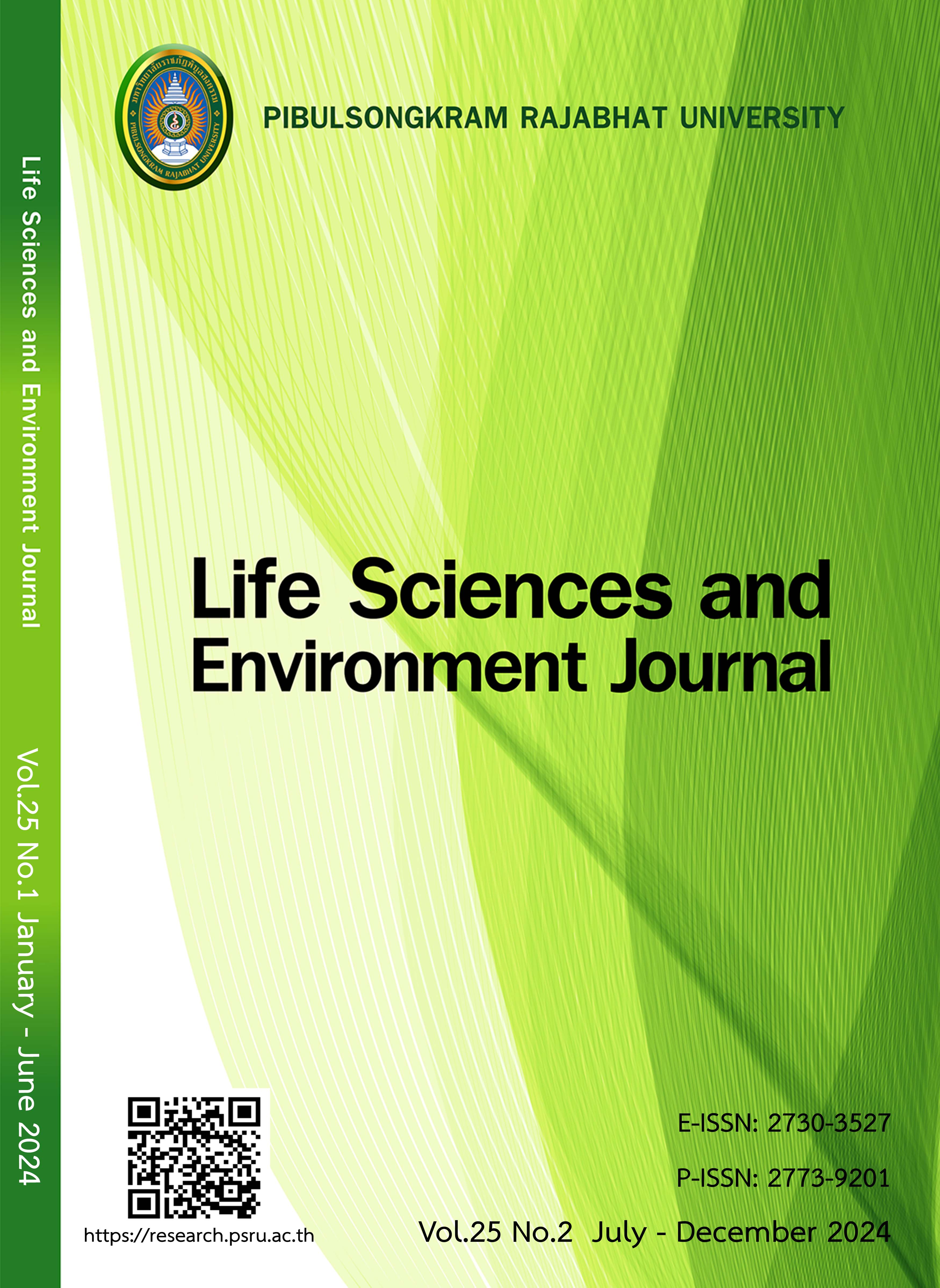SCREENING AND CHARACTERIZATION OF LACTIC ACID BACTERIA IN MODIFIED TEPACHE USING LOCAL RAW MATERIALS
DOI:
https://doi.org/10.14456/lsej.2024.35Keywords:
lactic acid bacteria, tepache, fermented fruit, probioticAbstract
Tepache, a traditional Mexican beverage made from fermented pineapple, is a popular non-alcoholic drink with growing commercial potential. This study aimed to modify the tepache formulation and screen for lactic acid bacteria (LAB) in the modified product. The optimized formula included kefir starter (5%), pineapple (20%), yam bean juice (30%), purple dragon fruit (10%), mangosteen (5%), apple (10%), sugar (10%), and water (10%) by volume. Fermentation was carried out under anaerobic conditions for 48 hours. Key parameters, including pH and total soluble solids (TSS), were monitored every 6 hours, alongside LAB screening and characterization. The pH decreased from 4.51 to 4.04, while TSS ranged from 12.13% to 9.87% (w/v) over the fermentation period. Microbial analysis showed an increase in cell density from 2.30 × 108 to 9.02 × 108 cells/mL and colony counts rising from 4.33 to 66.67 CFU/mL. Screening identified nine LAB isolates, including 4 cocci-shaped gram-positive and 5 rod-shaped gram-positive isolates, all catalase-negative. This study highlights the potential of modified tepache as a source of beneficial LAB strains for functional food applications.
References
Aguilar-Uscanga BR, González-Quezada E, Solis-Pacheco JR. Traditional Fermented Beverages in México; 2024.
Álvarez SA, Rocha-Guzmán NE, Moreno-Jiménez MR, Gallegos-Infante JA, Pérez-Martínez JD, Rosas-Flores W. Functional fermented beverage made with apple, tibicos, and pectic polysaccharides from prickly pear (Opuntia ficus-indica L. Mill) peels. Journal of Food Processing and Preservation 2021;45(9):e15745.
Álvarez-Rí, Figueredo-Urbina CJ, Casas A. Physical, chemical, and microbiological characteristics of pulque: Management of a fermented beverage in Michoacán, Mexico. Foods 2020;9(3):361.
de la Fuente-Salcido NM, Castañeda-Ramírez JC, García-Almendárez BE, Bideshi DK, Salcedo-Hernández R, Barboza-Corona JE. Isolation and characterization of bacteriocinogenic lactic bacteria from M-Tuba and Tepache, two traditional fermented beverages in México. Food science & nutrition 2015;3(5):434-42.
Fuente-Salcido NM, Castaneda-Ramírez JC, García-Almendárez DKB, Salcedo-Hernández R, Barbosa-Corona JE. Isolation and characterization of bacteriocinogenic lactic bacteria from M-Tuba and Tepache, two traditional fermented beverages in México. Food Science and Nutrition 2015;3:434-42.
Goyal R, Dhingra H, Bajpai P, Joshi N. Characterization of the Lactobacillus isolated from different curd samples. African Journal of Biotechnology 2012;11(79):14448-14452.
Gutiérrez-Sarmiento W, Peña-Ocaña BA, Lam-Gutiérrez A, Guzmán-Albores JM, Jasso-Chávez R, Ruíz-Valdiviezo VM. Microbial community structure, physicochemical characteristics and predictive functionalities of the Mexican tepache fermented beverage. Microbiological Research 2022;260: 127045.
Lara-Hidalgo CE, Hernández-Sánchez H, Hernández-Rodríguez C, Dorantes-Álvarez L. Yeasts in fermented foods and their probiotic potential. Austin Journal of Nutrition & Metabolism 2017;4:1045.
Li S, Liu X, Wang L, Wang K, Li M, Wang X, Wang Z. Innovative beverage creation through symbiotic microbial communities inspired by traditional fermented beverages: Current status, challenges and future directions. Critical Reviews in Food Science and Nutrition 2024;64(28):10456-83.
Oviedo-León JF, Cornejo-Mazón M, Ortiz-Hernández R, Torres-Ramírez N, Hernández-Sánchez H, Castro-Rodríguez DC. Exploration adhesion properties of Liquorilactobacillus and Lentilactobacillus isolated from two different sources of tepache kefir grains. Plos one 2024;19(2):e0297900.
Ramírez-Guzmán KN, Torres-León C, Martinez-Medina GA, de la Rosa O, Hernández-Almanza A, Alvarez-Perez OB, Aguilar CN. Traditional fermented beverages in Mexico. In Fermented beverages Woodhead Publishing; 2019.
Romero-Luna HE, Peredo-Lovillo A, Dávila-Ortiz G. Tepache: A Pre-Hispanic fermented beverage as a potential source of probiotic yeasts. In Hispanic Foods: Chemistry of Fermented American Chemical Society; 2022.
Sabira QAN, Suryani T. Glucose Levels and Organoleptic Quality Probiotic Tepache of Pineapple Peel on Variation of Sugar and Fermentation Duration. In Proceeding of International Conference on Biology Education, Natural Science, and Technology 2023;1:348-55.
Sukriadi EH, Rustomo WT, Astiana R. Tepache Kulit Nanas. Jurnal Pariwisata Indonesia 2020;18(1):28-37.
Thongprayoon C, Kaewput W, Hatch ST, Bathini T, Sharma K, Wijarnpreecha K, Ungprasert P, D’Costa M, Mao MA, Cheungp-asitporn W. Effects of probiotics on inflammation and uremic toxins among patients on dialysis: a systematic review and meta-analysis. Digestive Diseases and Sciences 2019;64:469-79.
Velázquez-Quiñones SE, Moreno-Jiménez MR, Gallegos-Infante JA, González-Laredo RF, Álvarez SA, Rosales-Villarreal MC, Rocha-Guzmán NE. Apple Tepache fermented with tibicos: Changes in chemical profiles, antioxidant activity and inhibition of digestive enzymes. Journal of Food Processing and Preservation 2021;45(7):e15597.
Watcharapoj S, Runchida D. Healthy beverage consumption among aging Thai consumers. Economics, Management and Sustainability, 2019;4(2):40-48.
Whittenbury R. Hydrogen peroxide formation and catalase activity in the lactic acid bacteria. Microbiology 1964;35(1):13-26.
Zellner SR, Gustin DF, Buck JD, Meyers SP. Growth and multiplication of Rhodotorula glutinis as determined by viable and total cell counts. Antonie van Leeuwenhoek 1963;29:203-210.
Downloads
Published
How to Cite
Issue
Section
License
Copyright (c) 2024 Life Sciences and Environment Journal

This work is licensed under a Creative Commons Attribution-NonCommercial-NoDerivatives 4.0 International License.
Each article is copyrighted © by its author(s) and is published under license from the author(s).










